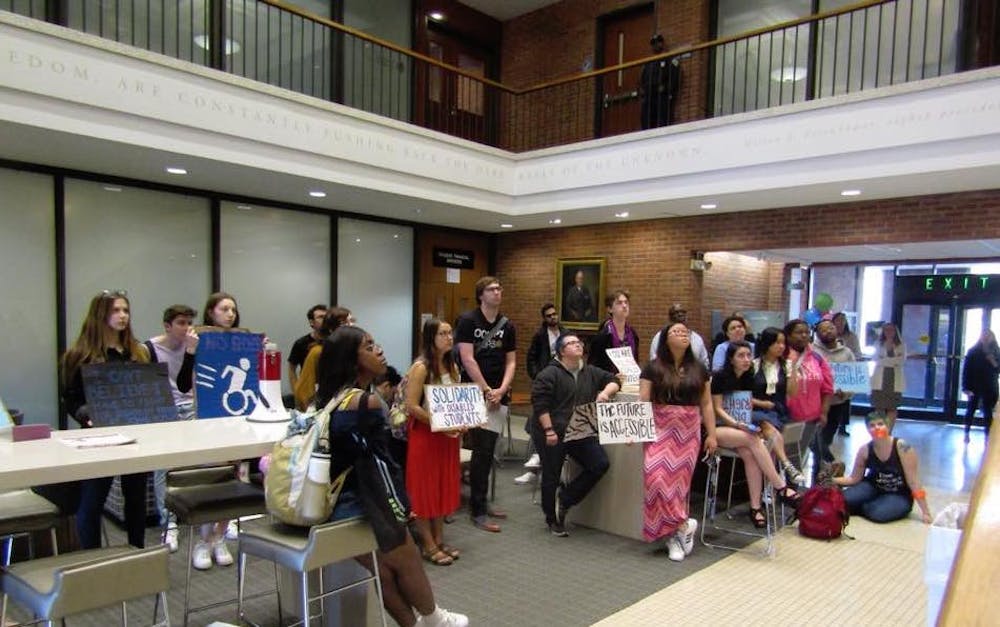The student organization Advocates for Disability Awareness (ADA) held a protest calling for better accommodations for students with disabilities in Garland Hall on Thursday, April 12.
ADA released a list of demands to administrators on April 2. The list details ways in which the University can provide better resources for students with disabilities. The group also demands that former director of Student Disability Services (SDS) Brent Mosser, who was fired this semester for confidential reasons, be reinstated.
Students gathered outside of Brody Learning Commons before marching to Garland. At Brody, freshman Sabrina Epstein, an ADA member, gave a speech explaining the purpose of the protest.
“We demand immediate changes that guarantee our rights and empowerment,” she said. “For too long we have been ignored, excluded and silenced. But now is the time that we speak out and demand the services required for students with disabilities to succeed at this University.”
At Garland Hall, students displayed posters with slogans like “The future is accessible,” “Diversity includes disability” and “Invisible disabilities exist.” Several ADA members spoke about their experiences navigating campus with a disability, including junior Chris Reinhardt.
Reinhardt was placed on academic probation after missing too many classes as a result of his disability. He said he felt lost and confused and did not know how to get help.
“I didn’t have accommodations for attendance, so my grades sucked,” he said. “I had countless meetings with professors where I attempted to explain what was happening and how it was affecting me. But I was told nothing could be done.”
Unable to keep up with classes due to the lack of accommodations, Reinhardt decided to take time off from Hopkins. He explained that this was when accommodations were recommended to him. When he returned to campus, his life improved.
“My test scores shot up. Professors were far more willing to work me,” he said. “Accommodations do work, but far too few students know about them or the application process.”
Sophomore Madelynn Wellons was also unaware of how to secure accommodations her freshman year, but said that Mosser helped her navigate Hopkins. However, Wellons said that there is still stigma at Hopkins surrounding students with disabilities.
“Roughly two thirds of my professors asked me explicitly what disability I have,” she said. “While I personally am comfortable talking about my disability, many students will not be. Not only that, but many of them asked in a very derogatory way, one of them even asking me, ‘What’s wrong with you?’”
Organizers decided to stage the protest in Garland since many administrative offices are located there, and they hoped to attract administrators’ attention. However, sophomore Anthony Boutros emphasized that ADA’s purpose was to enlist the University’s support in making life better for students with disabilities.
“I want members of the administration to know... we’re not here antagonistically,” he said. “We’re not here making claims that are unfair or destructive. We’re simply here demanding the rights and dignity that should be guaranteed to any person, and we demand to be viewed as people, to be recognized as such.”
Boutros also described how Crohn’s disease, an autoimmune illness, impacts his everyday life, noting that it restricts the kinds of food he can eat.
“I woke up this morning with severe abdominal pain. I’ve shoved down six pills of Tylenol so that I can stand here and speak to you,” he said. “I hope that everyone who doesn’t know this understands that this is such a real experience everyday.”
During the sit-in, Wellons and Boutros met with Vice Provost for Student Affairs Kevin Shollenberger, Vice Provost for Institutional Equity Kimberly Hewitt, American Disabilities Act Compliance Officer Aaron Hodukavich and Dean of Academic and Student Services Andrew Wilson to discuss the group’s demands.
Wellons believes that administrators can help ADA fulfill their goals. She said that she is doubtful that Mosser will be rehired but still hopes to work with administrators.
“As upset as we are about the firing, we still think of the administration as a potential ally. They’re very willing to work with us, and they’re trying their best,” she said. “They can help us, and they have the resources to help us. We just have to keep pushing.”
She said that there are already plans to move the SDS office from Garland Hall’s third floor to a larger and more accessible location. Many students have felt that the current office space is insufficient.
“It’s super tiny, it’s the size of my freshman dorm room. It’s like a closet,” she said. “The main reason they can’t hire more people is because there’s no space for them.”
Moving forward, ADA plans to continue to discuss their demands with administrators, according to Wellons. She is hopeful that they will establish timelines for the demands to be met and that they will be carried out.
“The issues were so complex, it was hard to just get through everything in one meeting,” she said. “We got some solid answers. We’re going to go through the other half of them next week.”
Freshman Eddy Basilio attended the protest to raise her voice on the issue of disability awareness. She was upset that Mosser had been fired since he had been a resource and ally to her since she first arrived at Hopkins.
“When I decided to come here I sat down and had a conversation with him about all my accommodations,” she said. “When I was in the hospital multiple times fall semester, he was there and he supported me. My attendance was being counted against me because of something I couldn’t help.”
Freshman Madeline Lee also attended the protest in hope that it would help increase visibility for students with disabilities.
“If anything comes out... it should be bigger awareness for people with disabilities and getting the public to know more about who we are,” she said.
Anna Gordon contributed reporting.





